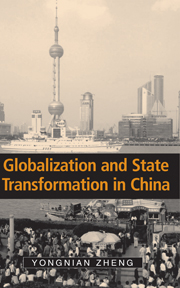Book contents
- Frontmatter
- Contents
- List of figures
- List of tables
- List of abbreviations
- Preface
- 1 Globalization: State decline or state rebuilding?
- 2 The state, leadership and globalization
- 3 Globalism, nationalism and selective importation
- 4 Power, interests, and the justification of capitalism: Constructing an interest-based political order
- 5 Bureaucratic reform and market accommodation
- 6 Building a modern economic state: Taxation, finance and enterprise system
- 7 State rebuilding, popular protest and collective action
- 8 Contending visions of the Chinese state: New Liberalism vs. the New Left
- 9 Globalization and towards a rule-based state governance?
- Notes
- Bibliography
- Index
- CAMBRIDGE ASIA-PACIFIC STUDIES
9 - Globalization and towards a rule-based state governance?
Published online by Cambridge University Press: 11 December 2009
- Frontmatter
- Contents
- List of figures
- List of tables
- List of abbreviations
- Preface
- 1 Globalization: State decline or state rebuilding?
- 2 The state, leadership and globalization
- 3 Globalism, nationalism and selective importation
- 4 Power, interests, and the justification of capitalism: Constructing an interest-based political order
- 5 Bureaucratic reform and market accommodation
- 6 Building a modern economic state: Taxation, finance and enterprise system
- 7 State rebuilding, popular protest and collective action
- 8 Contending visions of the Chinese state: New Liberalism vs. the New Left
- 9 Globalization and towards a rule-based state governance?
- Notes
- Bibliography
- Index
- CAMBRIDGE ASIA-PACIFIC STUDIES
Summary
Globalization, as defined by Badie, is a process of establishing an international system which tends towards unification of its rules, values, and objectives. Will globalization cause China's state governance to converge towards the international norm? I have so far discussed how globalization has led to the transformation of the Chinese state. State transformation is the result of the country's integration into the world market and global capitalism. Despite difficulties, the Chinese state has made enormous efforts to adjust the governance structure to accommodate globalization on the one hand, and facilitate the process of China's integration into the global system on the other. The Chinese leadership has developed a new mindset of globalism which perceives the integration of China into global capitalism as an inevitable process for the country to be a strong nation-state (Chapter 3). Therefore, the leadership has adjusted China's political order to accommodate a rising interest-based social order (Chapter 4), rebuild the state bureaucratic system and economic institutions to promote capitalistic economic development and nurture a nascent market economy (Chapters 5 and 6). All these reform measures appear to have moved China closer towards internationally accepted norms of the modern state.
Will capitalistic economic development in China lead the country down the road of democracy as has occurred in many countries? Will the Chinese leadership be able to internationalize its political system as it has done with its economic system? Some scholars and policy-makers believe so.
- Type
- Chapter
- Information
- Globalization and State Transformation in China , pp. 187 - 202Publisher: Cambridge University PressPrint publication year: 2003

